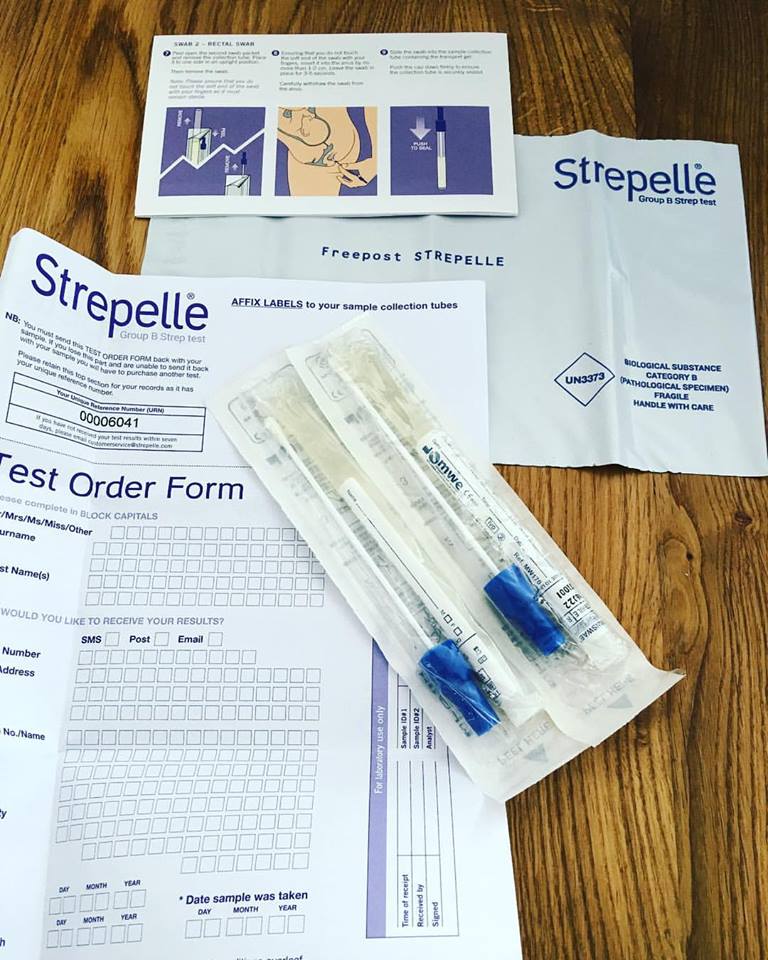Have you heard of Group B Strep?
I am 40 years old
Weeks away from giving birth to my fifth baby
And I had not heard of this until the last few months
My best friend
Had Group B Strep
When she gave birth to her son
Almost 16 years ago
So I must have heard of it
I just wasn’t listening
But now thanks to a vigorous campaign by
GBSS
And thanks to private testing companies
Such as Strepelle
Awareness is being raised
And more women are being tested
But why?
What is it?
What is Group B Strep?
Group B Streptococcus (GBS) is a normal bacterium which is carried by 20-30% of adults, most commonly in the gut, and for up to 25% of women, in the vagina, usually without symptoms or side-effects.
GBS can occasionally cause infection, most commonly in newborn babies, sometimes in adults and, very rarely, during pregnancy and before labour.
How can Group B Strep Infection affect newborn babies?
There are two types of GBS infection in newborns: early and late-onset.
Early-onset GBS infection is more common (2/3 of cases in babies) and occurs when the baby is up to 6 days old; a key symptom is the rapid development of breathing problems, associated with blood poisoning.
Late-onset GBS infection – usually presenting as GBS meningitis – occurs between age 6 days and 1 month and, more rarely, up to age 3 months. After 3 months’ old, GBS infection in babies is extremely rare.
GBS is recognised to cause preterm delivery, maternal infections, stillbirths and late miscarriages; and preterm babies are known to be at particular risk of GBS infection as their immune systems are not as well developed.
Overall, approximately one in every 1,000 babies born in the UK develops group B Strep infection.
On average in the UK, at least
two babies a day develop a group B Strep infection
one baby a week dies from their GBS infection, and
one baby a week survives with long-term disabilities – physical, mental or both.
How can I get tested?
In the UK routine antenatal testing is currently not offered by the NHS. This is in sharp contrast to many other developed countries who provide GBS screening to all pregnant women.
Health services in the UK rely upon a ‘risk factor’ system to determine which newborns are more likely to be at-risk of developing GBS infection. The system looks at factors such as high temperature during labour, labour starting preterm or waters breaking early. Intravenous antibiotics given in labour to women carrying GBS have been proven to dramatically reduce the risk. This ‘risk factor’ system could be significantly improved upon as the rate of GBS infections in babies is not going down.
Strepelle can change this, it is an accurate and easy to use home to laboratory test for use from 35 weeks onwards into pregnancy. The test allows you to take control of your unborn baby’s future health.

How does the test work?
Strepelle very kindly offered to send me a home testing kit
After seeing me share lots of tweets about GBS over the past weeks and months
It has really worried me that this is something all pregnant women should be aware of
But until very recently it has not been something on my radar at all
Even though I have had preterm babies
And lost a baby in infancy
Once I was made aware
I knew that I wanted to be tested
Before giving birth to our fifth and final baby
Strepelle provides a home testing kit
That is easy to use
And offers fast results direct from the laboratory
To your email inbox, post box or phone
The test costs around £40
And could save your baby’s life
The test needs to be carried out
After 35 weeks of pregnancy
I tested just before I hit 37 weeks
I would have tested earlier if it had not been for the long Easter weekend
You have to send your test the day that you use it
For the best chance of a true result
You can buy the test direct from Strepelle
Through their website
But what exactly do I do?
What does the test involve?
The test is made up of two swabs
Vaginal and anal
There is a simple form to fill in with your details
Then you take the swabs
Secure them in a test tube filled with special gel for transportation
And free post back to the lab
I was nervous about carrying out the test
And so asked David to help me
We both washed our hands
Followed the written and pictorial instructions
Very carefully
Aiming to keep the swabs sterile
The vaginal swab was easy to do
The anal one was more tricky
More uncomfortable
And I am not very confident that we collected what we needed to
But we did try
One important thing to note
Is that the instructions fail to mention
That there is a second cap on the test tubes
I am guessing that protects the carrier gel
This cap is not mentioned
So we got quite stressed trying to firmly push
The first swab into the first tube
Once we realised about the cap
The remainder of the process went smoothly
But I do wonder if this will have adversely affected our sterile swabs
And so the test result
I am certain that we cannot be the first testers to come across this anomaly
And so am equally certain that Strepelle will be updating their instructional information
The test
With all the paperwork
Took less than 10 minutes
And now we wait 7 days for our results
And whatever the result I will be glad to have taken the test
If I do prove to be a carrier of Group Strep B
Then I can make my midwife and Consultant team aware
So that the appropriate action can be taken
When labour starts and when our baby is born
If you would like anymore information about GBS
Or need any additional support
Please do check out the GBSS website
And follow them on Twitter @GBSSuppport
For more information about the test
You can contact Strepelle through their website
Or on Twitter @Strepelle1
Whatever you do
Be #GBSAware
We were sent one Strepelle Testing Kit for the purpose of this review

Group B strep was picked up during my second pregnancy when they did a swab to try & find the reason for random bleeding at 18 & 21 weeks. I was told by my midwife that under no circumstances should I Google it – that’s immediately what I did!! I was a little scared by what I read but figured there wasn’t anything I could do so shouldn’t worry. When my waters broke & I called the hospital I told them about it but they didn’t seem too bothered as I didn’t have enough of the risk factors to warrant the in-labour antibiotics. We mentioned it again when I was in the antenatal room but got the same response. However, when my son was born they whisked him away fairly quickly to check him & then spent the next 12 hours doing 2 hourly obs. Once they were happy that he was fine they were willing to let us go home – he’s now a very healthy, happy 2.5 year old.
Oh this is a great idea, more needs to be done to raise awareness and it’s brilliant that it is now easier to test for.
Nat.x
Hi what an important subject
X mine was picked up during early miscarriage and i now know all about it And labour etc
I been through 5 pregnancies with strength b prevention
But I need to know to inform hospital and at times speak up
About my prevention plan
Aldo I would like to say shout up
Loud to get test done from doc X shout loud and demand test
Docs charge £18 but often do it free
Group b strep support helped me so much and I’m thankful to
Them as they give guidelines for birth plan to
Prevent stab b infection in newborns
Oh I did not know to ask doctor! Thank you for your comment and yes we should all shout out and demand NHS routine testing
I am colonised by GBS and they didn’t swab me in my last two pregnancies until I was actually in labour. Which, considering I have very fast labours, was a bit too late! Thankfully, I didn’t have active infection at either of those times although I have since. It is an unnecessary lottery.
With strep b ,it is always there so if infection hadn’t flared during labour ,still important more than vital
to Iv antibiotics ,always if you have had strep b once it means you will always have it X
If anyone has strep b once and then been in labour and strep didn’t show up ,still vital to have Iv antibiotics and follow group strep prevention plan X my hos did anyway , I would put it in my plan with big sticker on front ” streb b action required ” regardless if it didn’t flare up
Or not
Hi thank you so much for sharing!! My daughter Ella was stillborn at 41wks and 2days due to a group b strep infection, had never heard of it before this happened!
Almost 6 years on and I am currently 34 weeks pregnant and due to have a section 25th May. I sent off my strepelle test on Monday and am waiting for results. Sooooo glad you have said about that second cap!! We actually snapped on of the swabs (luckily had a backup!) and it made the test more stressful then necessary! Have you contacted them about this as yet? I am just waiting for the results and will then be emailing them!! Good luck with bubba and please update when you get the results! Thanks, Natalie x
I am so very sorry for your loss. Best of luck with your new arrival. My results came back yesterday and were negative x
If you’ve had strep b in past always have Iv antibiotics even if it doesn’t show on next test
It always requires Iv anyibiotics I would refuse a second test
As I have it in past so
Labour prevention if strep b must be carried out
So I demand Iv antibiotics
Even if you do not have active flare up during labour STILL have Iv antibiotics
Also if waters break Iv antibiotics required prompt
Xx
Women who
Have had strep b should have Iv antibiotics during labour no matter what latest strep b test shows ,even if it comes back showing nothing ,always need Iv antibiotics
this is our right
Write it on front of notes and demand
One midwife said to me ” oh you don’t have it , you don’t need test ” I said if I had it 5 yrs ago it still means I have it
,she’d isn’t know so that was a shock
Next midwife “yes of course ,we cover you always ”
Staff still do not know ,so we need to stick up
For ourselves xx I took in the group b strep notes regarding protocol
To support me